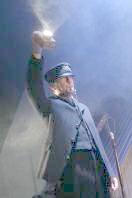SITE GUIDE
SEARCH
REVIEWS
FEATURES
NEWS
Etcetera and
Short Term Listings
LISTINGS
Broadway
Off-Broadway
NYC Restaurants
BOOKS and CDs
OTHER PLACES
Berkshires
London
California
New Jersey
DC
Philadelphia
Elsewhere
QUOTES
TKTS
PLAYWRIGHTS' ALBUMS
LETTERS TO EDITOR
FILM
LINKS
MISCELLANEOUS
Free Updates
Masthead
Writing for Us
A CurtainUp  London Review
London Review
 London Review
London ReviewKindertransport
|
Germany spat me out. England took me in.
< ---- Eva
|

Alexi Kaye Campbell as the station guard
(Photo: Robert Day ) |
The plot follows just a single girl’s experience of the so-called Kindertransport: Nine year old Eva (Matti Houghton). The play opens with her mother (Pandora Colin) preparing her for exile and independence with a harsh sewing lesson and with a too-large coat which must last her into the unforeseeable future. Eva’s journey is followed, from arriving in England, to adoption by the homely Lil (Eileen O’Brien) and gradual acculturation in her new home. In scenes acted out in parallel, we also see Eva forty years later, now renamed Evelyn, as she prepares her own teenage daughter for leaving home.
In the background, lurks the German folklore figure of the Ratcatcher (Alexi Kaye Campbell): a Struwelpeter-like villain. As thief of a whole generation of children, he assumes paradigmatic importance in this historical context. Eva’s favourite bedtime story thus becomes the embodiment of her fear and expatriation. He emerges and prowls onstage whenever family tensions rise, or when the emotional damage done to Eva resurfaces. This character, with his gnarled, half-hooded face and incredibly creepy movement, is the most obvious signal that this is a production by the innovative Shared Experience.
The rest of the cast are equally worthy of the company’s high standards. Matti Houghton’s performance as Eva spans seven years until she is 16 and convincingly portrays the changes she undergoes. Her refined accent from her elegant German background gives way to stilted English with a receding foreign accent as she gets older. There is also a good sense of continuity with her grownup self, played by Marion Bailey. Her performance subtly conveys Evelyn’s ingrained unhappiness and deeply-embedded neurosis. Lil O’Brien is also excellent as Eva’s down-to-earth, kindly adoptive mother.
Diane Samuels’ writing is naturalistic when dealing with so grave a subject. Even in the midst of messy, nasty familial recriminations, she manages to avoid melodrama. It is a brave portrayal of an unreconciled past, and there is a sense of irrevocable damage done to Eva, who is denied any happy family reunions after the war. As she tells Lil, "I don’t want to blame you, I want it never to have happened." The staging is full of metaphorical significance as Evelyn’s painful past is played out in the cramped attic room where she now hides the few relics from her German roots. It becomes clear that her past, suppressed and ignored, is still happening. Diane Samuels has a gift for depicting universal human themes, in spite of the specific political context. Exploring the perennially knotty and intricate relationship between children and parents, between independence and self-sacrifice, this is a poignant play which nears modern classic status.
|
KINDERTRANSPORT
Written by Diane Samuels Directed by Polly Teale With: Marion Bailey, Lily Bevan, Alexi Kaye Campbell, Pandora Colin, Matti Houghton, Eileen O’Brien Design: Jonathan Fensom Lighting: Natasha Chivers Movement: Liz Ranken Sound: Peter Salem Running time: Two hours with one interval A Shared Experience and Hampstead Theatre production Box Office: 020 7722 9301 Booking at Hampstead to 26th May 2007 and then on tour to: Nuffield Theatre, Southampton 29 May - 2 June 2007 Box Office: 023 8067 1771, and Oxford Playhouse 5 - 9 June 2007 Box Office: 01865 305305 Reviewed by Charlotte Loveridge based on 25th April 2007 performance at Hampstead Theatre, Eton Avenue, Swiss Cottage NW3 3EU (Tube: Swiss Cottage) |
|
London Theatre Tickets Lion King Tickets Billy Elliot Tickets Mary Poppins Tickets Mamma Mia Tickets We Will Rock You Tickets Theatre Tickets |




